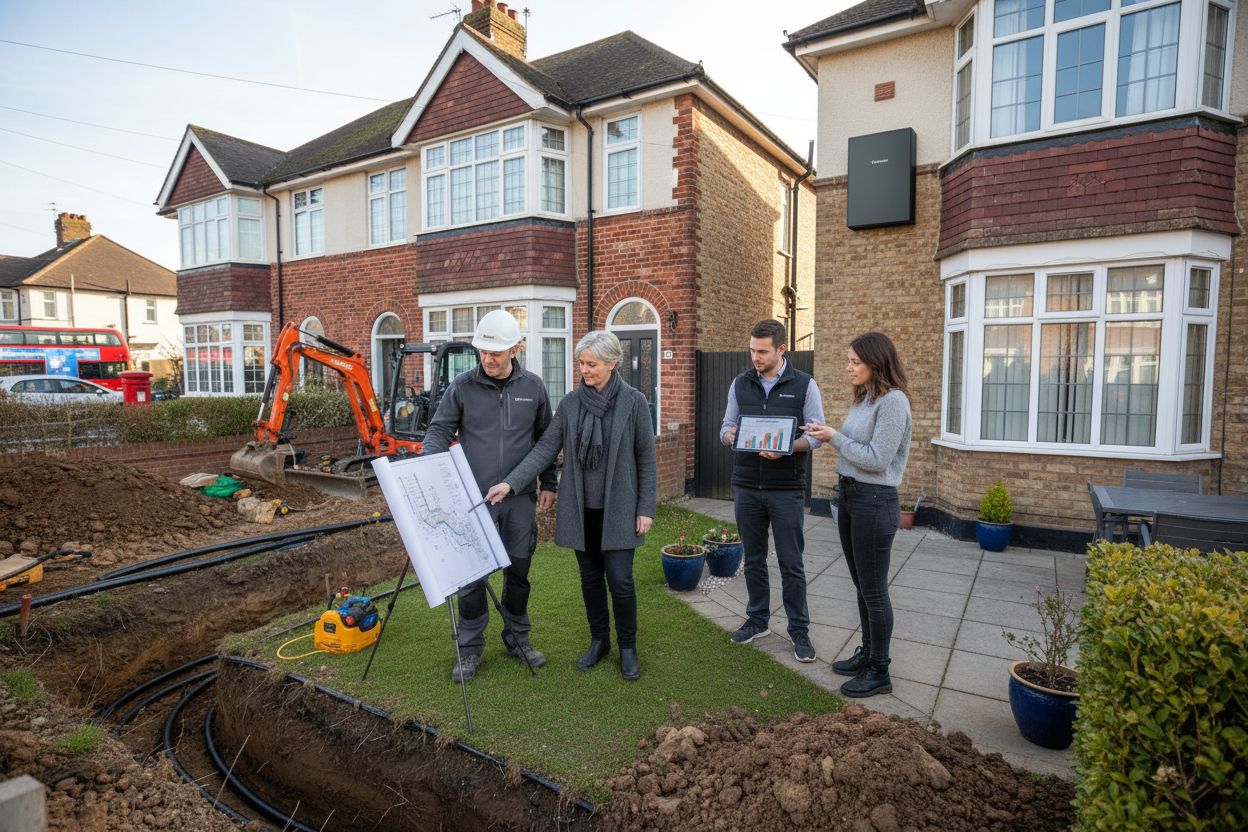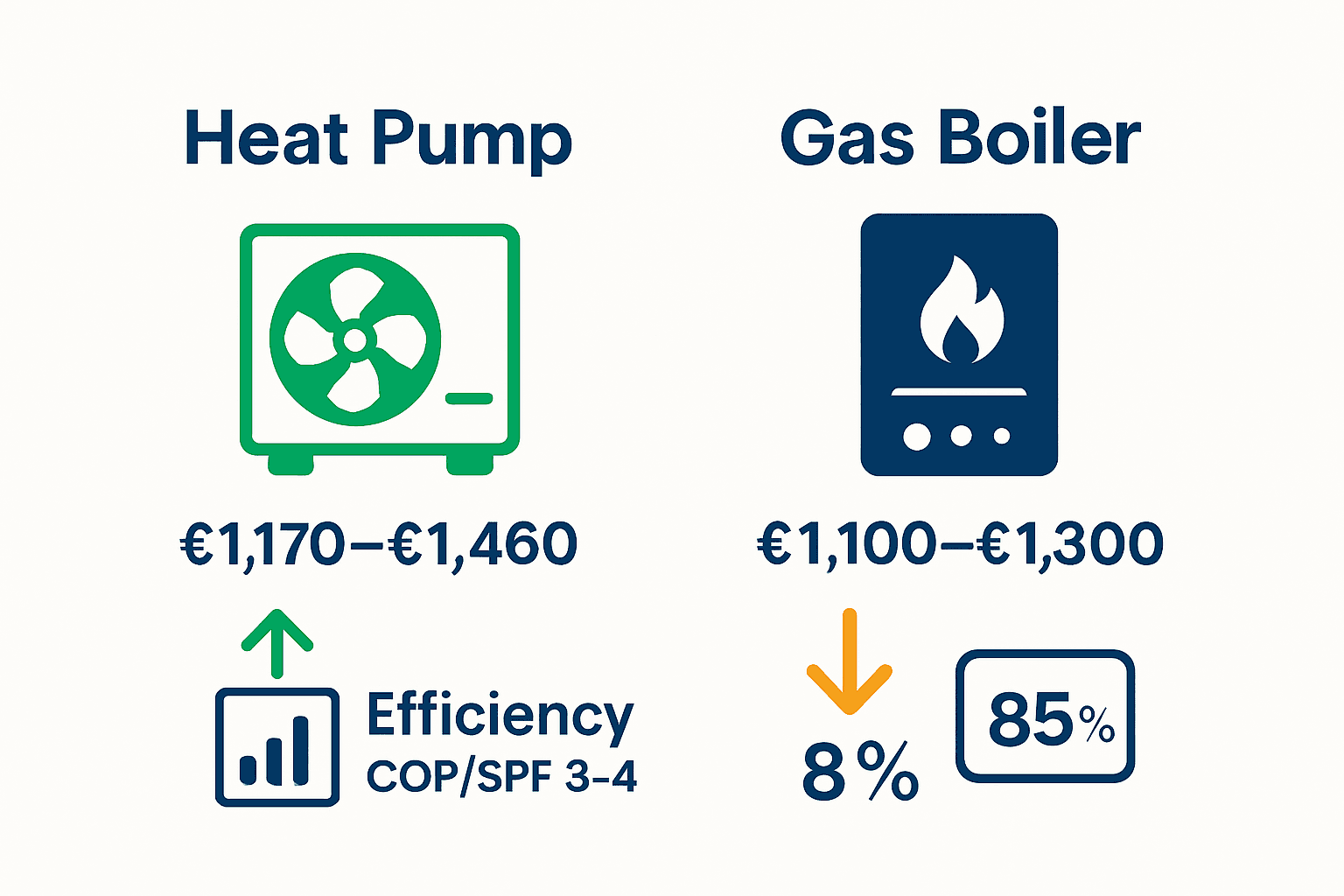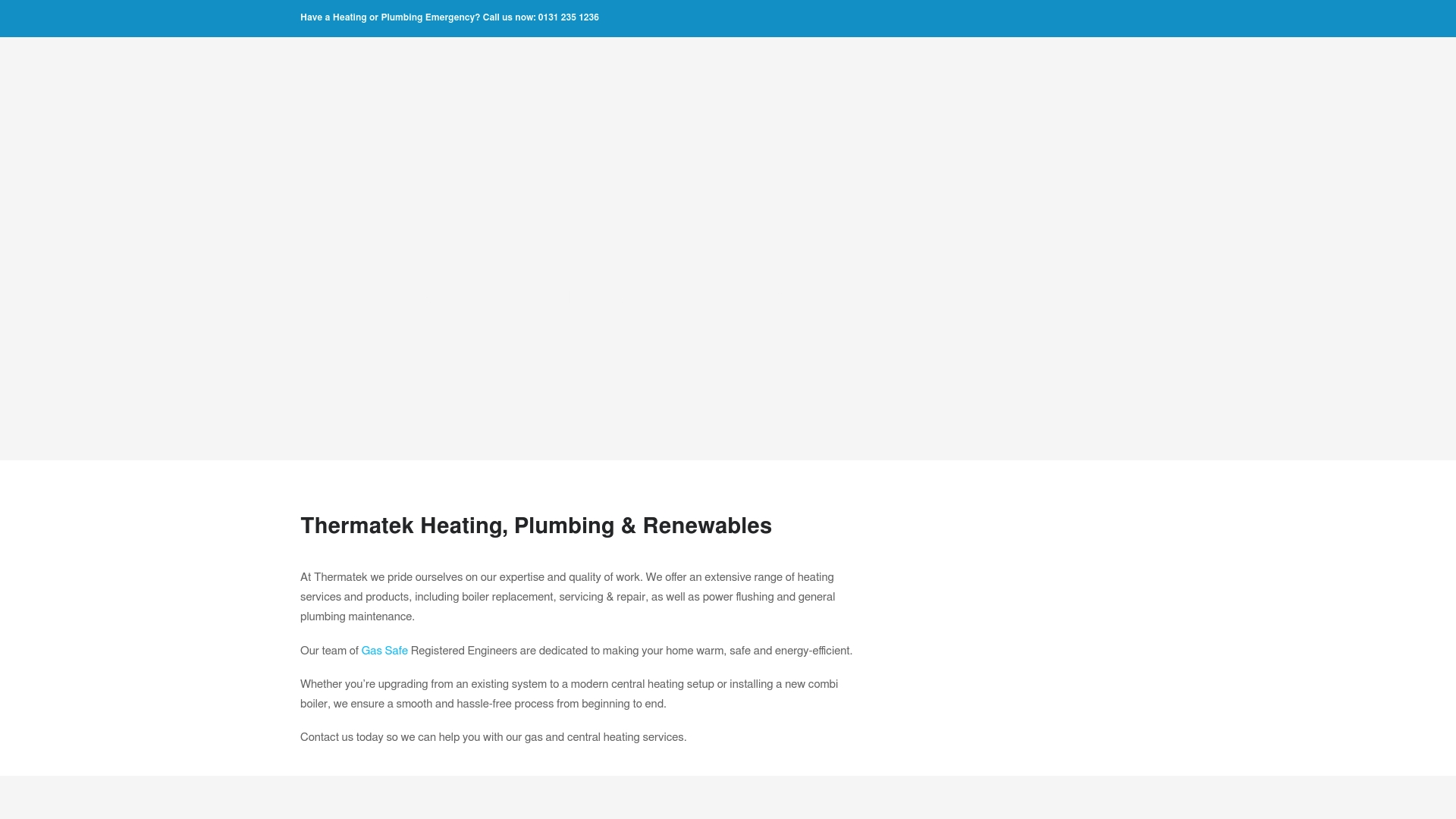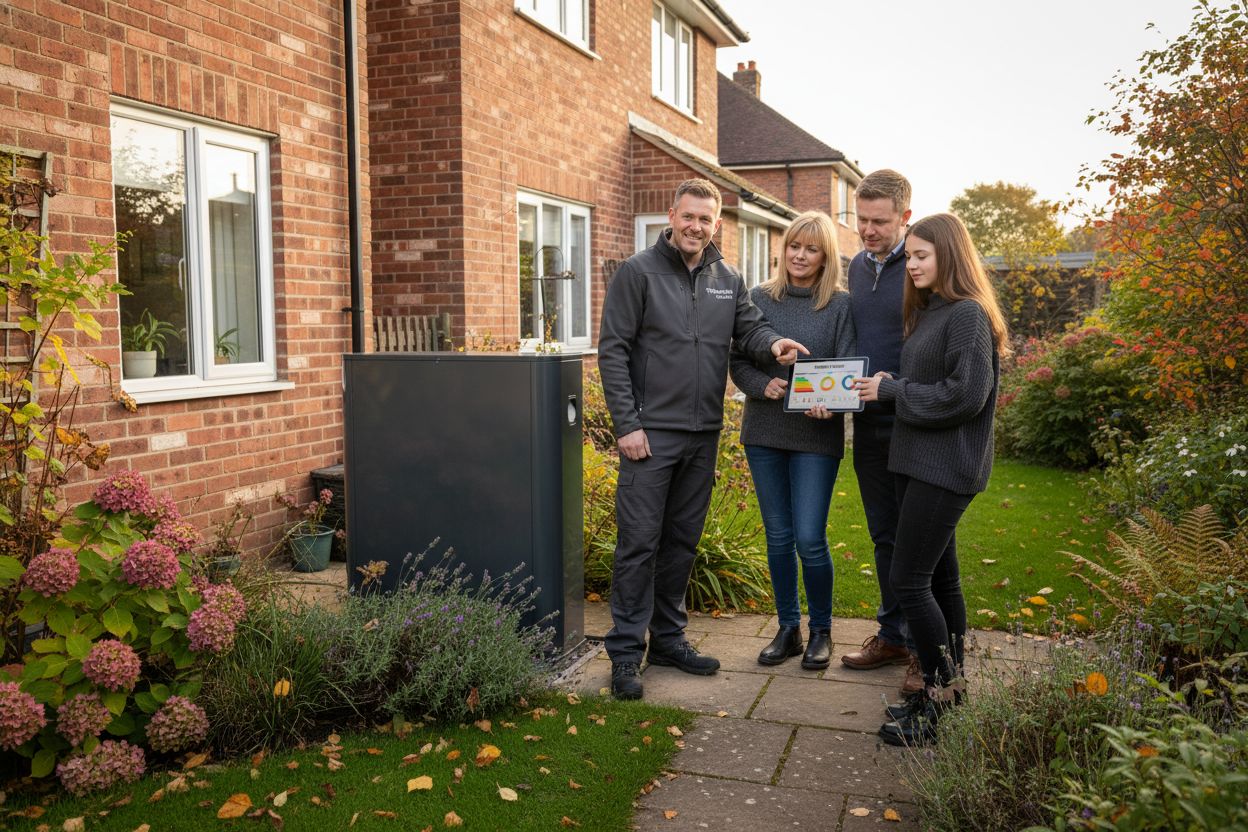Complete Guide to Heat Pump Running Costs UK
Did you know that a heat pump can generate warmth for almost the same price as a high-efficiency gas boiler, with the cost starting at just 6.5 pence per kilowatt hour? As more homeowners look for better ways to cut heating bills and carbon emissions, understanding these numbers becomes vital. Clarity on running costs and system efficiency can help you weigh if a heat pump is the smart move for comfortable, sustainable living.
Key Takeaways
| Point | Details |
|---|---|
| Competitiveness of Costs | Heat pumps can achieve comparable running costs to gas boilers, especially with high seasonal performance factors (SPF). |
| Installation Variability | Different types of heat pumps (air-source and ground-source) vary significantly in installation costs and efficiency, influencing long-term savings. |
| Energy Efficiency Advantages | Heat pumps offer lower energy consumption and reduced carbon emissions compared to traditional heating methods, making them an environmentally friendly choice. |
| Maintenance Importance | Regular maintenance is essential for optimal performance and longevity, impacting overall efficiency and running costs. |
Table of Contents
- Understanding Heat Pump Running Costs
- Types of Heat Pumps And Efficiency
- How Heat Pumps Work In UK Homes
- Factors Affecting Running Costs
- Comparing Heat Pumps To Other Heating Options
- Typical Running Costs And Maintenance
Understanding Heat Pump Running Costs
When considering renewable heating solutions, understanding heat pump running costs is crucial for homeowners exploring energy-efficient alternatives. According to research from the Centre for Alternative Technology, heat pumps can deliver remarkably competitive operational expenses compared to traditional heating systems.
The economics of heat pumps are fascinating. With current electricity prices around 22.5 p/kWh and gas prices at 5.5 p/kWh, a heat pump operating at a seasonal performance factor (SPF) of 3.5 can generate heat at approximately 6.5 p/kWh. This cost is remarkably similar to a modern gas boiler running at 85% efficiency. Moreover, improvements in system efficiency can drive these costs even lower – for instance, an SPF of 4 can reduce heating costs to around 5.5 p/kWh.
Monthly running costs provide another perspective on heat pump economics. The Eco Experts highlight that under the Ofgem price cap in 2025, while a gas boiler might cost around £70 per month, an air-source heat pump is estimated at approximately £80 monthly. However, this slight increase is offset by significant energy efficiency advantages:
- Heat pumps use substantially less energy to produce equivalent heat
- Lower carbon emissions compared to fossil fuel systems
- Potential for further cost reduction through smart energy tariffs
- Long-term savings through reduced energy consumption
For Edinburgh and Midlothian homeowners considering renewable heating solutions, understanding these nuanced running costs can help make an informed decision about transitioning to more sustainable home heating technologies.
Types of Heat Pumps and Efficiency
When exploring renewable heating solutions, understanding the different types of heat pumps can help homeowners make informed decisions. According to research from the Centre for Alternative Technology, three primary heat pump technologies exist: air-source, ground-source, and water-source, each with unique characteristics and efficiency levels.
Air Source Heat Pumps
Air-source heat pumps (ASHPs) are the most accessible option for many homeowners. They remain effective even in temperatures below zero and offer a more affordable installation pathway. Our guide on understanding air source heat pumps reveals installation costs typically range from £7,000 for a two-bedroom home to £15,000 for larger properties. Key advantages include:
- Lower upfront installation costs
- Effective performance across various temperature ranges
- Easier retrofitting for existing properties
- Relatively simple maintenance requirements
Ground Source Heat Pumps
Ground-source heat pumps (GSHPs) represent the pinnacle of heat pump efficiency. These systems leverage consistent underground temperatures around 10°C at approximately 2 metres depth, providing remarkable energy performance. However, they come with higher initial investment, with installation costs ranging from £17,000 to over £35,000 depending on property size.
The primary trade-offs between different heat pump technologies essentially balance installation complexity, upfront costs, and long-term energy efficiency. While air-source systems offer more straightforward implementation, ground-source solutions provide superior thermal stability and potentially lower ongoing operational expenses.

Here’s a comparison of the main heat pump types and their characteristics:
| Feature | Air Source Heat Pump | Ground Source Heat Pump |
|---|---|---|
| Typical Installation Cost | £7,000–£15,000 | £17,000–£35,000+ |
| Efficiency (COP/SPF) | 3 to 3.5 (SPF) | 3.5 to 4+ (SPF) |
| Installation Complexity | Low Easier retrofit | High Requires excavation |
| Ideal Conditions | Most UK homes Wide temperature range | Large gardens Consistent ground temperature |
| Maintenance Needs | Moderate Accessible | Low to Moderate Specialist checks |
How Heat Pumps Work in UK Homes
Heat pumps represent a sophisticated yet ingenious approach to home heating, fundamentally different from traditional fossil fuel systems. According to experts at The Eco Experts, these systems operate by extracting heat using electricity-driven compressors and transferring that heat into water or air, rather than generating heat directly through combustion.
Heating Mechanism
The core principle of heat pump technology involves moving thermal energy from one location to another. This means they can extract heat from external sources like air, ground, or water, even at relatively low temperatures. Two primary system configurations exist:
- Air-to-Water Systems: Heat radiators and provide domestic hot water
- Air-to-Air Systems: Distribute warmth through vents or ducted systems
Efficiency Considerations
Efficiency in heat pumps is closely tied to temperature differentials. Research from the Centre for Alternative Technology highlights that these systems perform optimally when the temperature gap between heat source and heating demand remains minimal. Ground-source heat pumps benefit from stable underground temperatures, while air-source models might experience slight efficiency reductions during cold spells that require defrost cycles.
Installation and Performance
For homeowners considering heat pump installation, understanding these operational nuances is crucial. The electricity-driven compressor acts like a reverse refrigerator, moving thermal energy where it’s needed most. This approach not only provides efficient heating but also supports the transition towards more sustainable home energy solutions.
Factors Affecting Running Costs
Understanding the variables that influence heat pump running costs is crucial for homeowners considering this renewable heating technology. According to research from Eco Energy Services, multiple factors can significantly impact the annual operational expenses of a heat pump system.
Key Cost Determinants
The primary factors affecting heat pump running costs include:
- Electricity Tariffs: Specialized heat pump electricity rates can dramatically reduce expenses
- Home Insulation: Better insulation means less energy required to maintain temperature
- Heating System Setup: Radiator or underfloor heating configurations influence efficiency
- System Quality: Higher-grade installations deliver more consistent performance
Performance and Cost Variations
Coefficient of Performance (COP) plays a critical role in determining running expenses. Research from Neater Heat indicates that typical daily running costs range between £3.20 and £4.00, translating to annual costs of approximately £1,170–£1,460. Remarkably, good insulation and smart energy tariffs can reduce bills by up to 40% compared to traditional oil or LPG systems.
Efficiency Optimization
Homeowners can explore heat pump installation strategies to maximize efficiency. Seasonal variations in COP—ranging from 3 to 3.5—can cause annual cost fluctuations between £1,316 and £1,476 for an 18,000 kWh heat demand. Strategic choices in system design, energy management, and tariff selection can significantly mitigate these running costs.
Comparing Heat Pumps to Other Heating Options
When evaluating home heating technologies, heat pumps represent a significant leap forward in energy efficiency and environmental sustainability. Unlike traditional fossil fuel heating systems, heat pumps offer a more nuanced approach to thermal management that balances economic and ecological considerations.
Traditional Heating Systems
Gas and oil boilers have long been the standard for home heating in the UK. However, heat pumps provide several compelling advantages:
- Lower carbon emissions compared to fossil fuel systems
- Reduced dependency on fluctuating fuel prices
- Potential for integration with renewable electricity sources
- Lower long-term environmental impact
Economic and Environmental Perspectives
The transition from conventional heating to heat pump technology isn’t just an environmental choice—it’s an increasingly smart economic decision. Our comprehensive guide to air source heat pump benefits highlights how these systems can deliver substantial long-term savings and enhanced home comfort.
Performance Considerations
While initial installation costs for heat pumps may be higher than traditional systems, their operational efficiency tells a different story. Heat pumps can extract renewable thermal energy from air, ground, or water sources, converting electricity into heat with remarkable efficiency. This means lower ongoing energy expenses and a reduced carbon footprint for homeowners willing to invest in modern heating technology.

Typical Running Costs and Maintenance
Maintaining a heat pump system requires a strategic approach that balances proactive care with professional servicing. Homeowners investing in these advanced heating technologies need to understand both the operational expenses and maintenance requirements to ensure long-term efficiency and performance.
Annual Maintenance Requirements
Regular maintenance is crucial for keeping your heat pump operating at peak performance. Recommended maintenance tasks include:
- Annual professional system inspection
- Cleaning or replacing air filters every 3-4 months
- Checking refrigerant levels
- Inspecting external unit for debris or vegetation growth
- Ensuring clear airflow around outdoor components
Cost Considerations
While maintenance costs can vary, most homeowners can expect:
- Annual professional service: £100-£250
- Filter replacements: £20-£50 per year
- Minor repairs: £150-£300 depending on complexity
Long-Term Performance
For detailed heat pump installation guidance, understanding ongoing maintenance is key. Professional servicing not only prevents unexpected breakdowns but can extend the system’s operational life by 25-30%. Proactive maintenance helps maintain the system’s efficiency, ensuring you continue to benefit from lower energy consumption and reduced carbon emissions throughout the heat pump’s lifecycle.
Ready to Take Control of Your Heat Pump Running Costs?
Lowering your energy bills and ensuring consistent warmth should not be a guessing game. The article above outlines how real running costs, system performance, and smart installation choices make a world of difference. If you are wondering how to maximise the efficiency of your air source heat pump or want practical support with maintenance, know that working with a reliable local expert is key to protecting your investment.

Let Thermatek Heating help you unlock the full savings potential of your home. Our air source heat pump installation and renewable heating solutions are professionally tailored for Edinburgh and Midlothian properties. From free guidance to Gas Safe Registered installation and expert maintenance, we are the trusted team for energy-efficient home heating. Visit Thermatek Heating now to arrange a free quote and take the next step towards reliable, cost-effective warmth all year round.
Frequently Asked Questions
What are the average running costs of heat pumps?
The average running costs of heat pumps can vary, but typically they range between £1,170 and £1,460 annually, depending on factors like system efficiency and energy tariffs.
How do heat pump running costs compare to traditional heating systems?
Heat pumps generally have similar operational costs to modern gas boilers, especially when considering their higher energy efficiency and lower carbon emissions over time.
What factors influence the running costs of heat pumps?
Key factors affecting heat pump running costs include electricity tariffs, home insulation quality, heating system setup, and the overall quality of the installation.
Do heat pumps require much maintenance, and what are the associated costs?
Yes, heat pumps require regular maintenance, including annual professional inspections and periodic filter replacements. Maintenance costs typically range from £100 to £250 per year for professional services, with additional costs for minor repairs and filter replacements.

